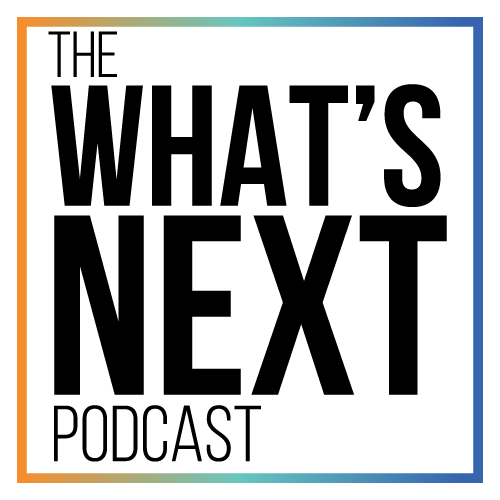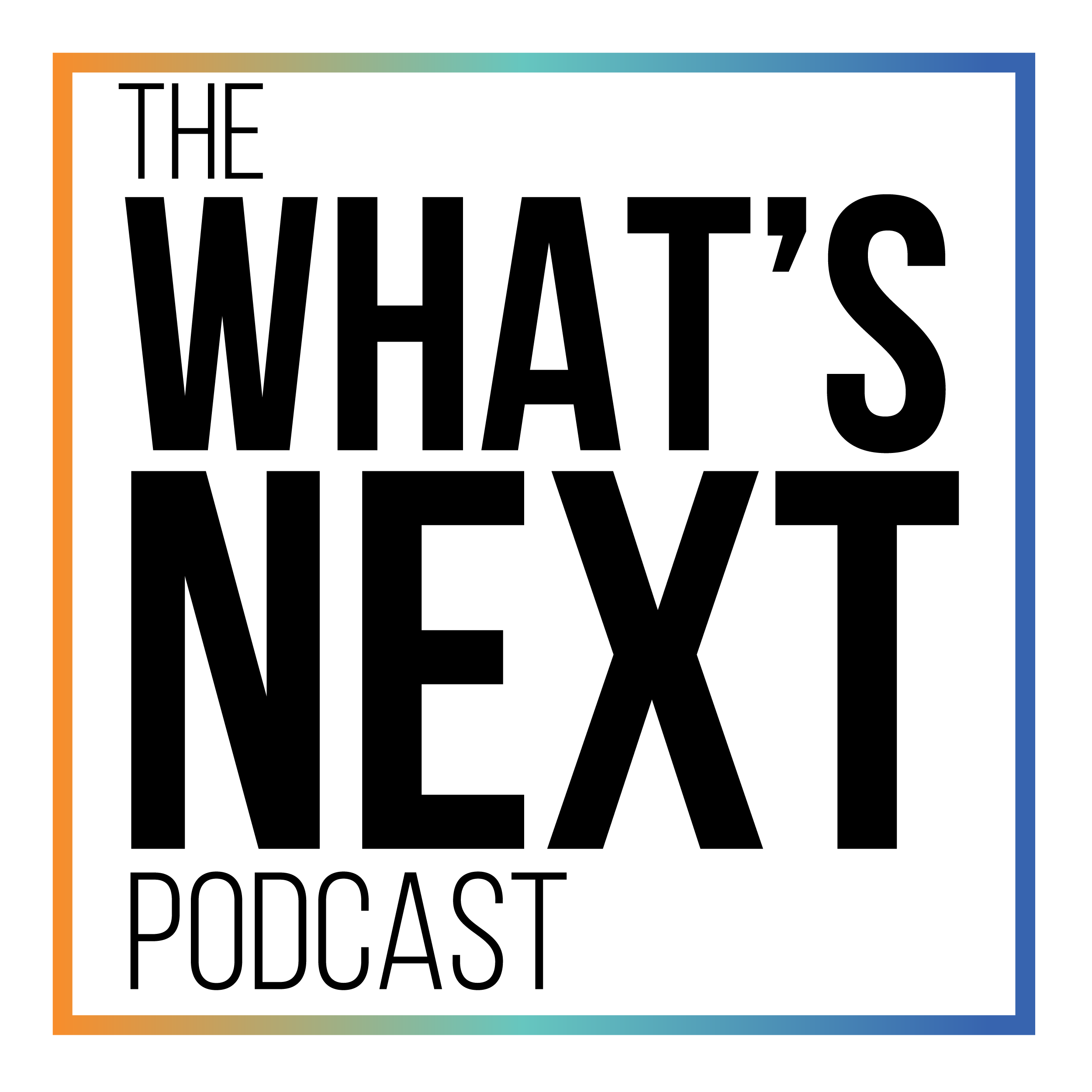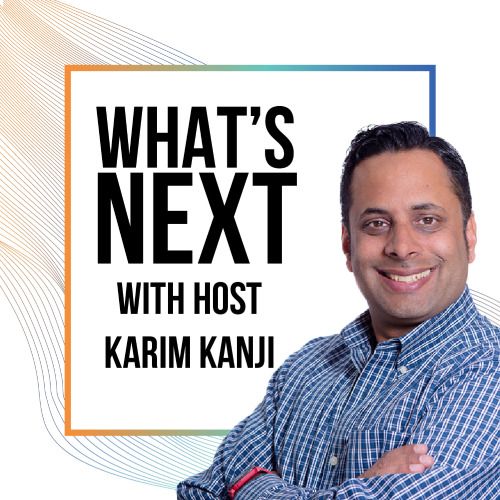Episode 10
What's Next with Dan Bates
We speak to Dan Bates, Founder and CEO of Rebel Energy about launching a new breed of energy supplier in the UK. Dan's mission with Rebel Energy is to address inequality and the climate crisis with a startup that addresses 3 mega trends in the energy industry:
1. Global Regulatory Changes. This can be seen in the USA's renewed commitment to the Paris Agreement, many countries and businesses commitment to carbon neutrality by the middle of the century and the upcoming COP26 UN Climate Change Conference taking place in Glasgow, Scotland later this year.
2.Technology Changes. With advancements in wind, solar and tidal energy generation and the huge shift over to electric vehicles.
3. Consumer Changes. Consumers are seeking more ethical businesses, exploring choices and placing money into companies that they trust.
Dan also discusses the UK startup culture that has enabled challenger, 'disrupter' businesses to flourish with many traditional barriers disappearing.
ABOUT DAN BATES
Dan is the CEO and founder of Rebel Energy, a supplier of energy to UK households. Rebel Energy is built around a social mission to provide affordable clean energy. Dan has a desire to make a difference in society and show that big business can be good business. Prior to founding Rebel Energy, Dan spent over 15 years at BP in a variety of senior leadership roles.
ABOUT REBEL ENERGY
Rebel Energy is a new breed of energy supplier, providing clean energy to households in the UK at an affordable price. Rebel’s on a mission to address inequality and combat the climate crisis with a benevolent mindset. Rebel with a cause, energy with a difference.
---------------------------------------
FOLLOW US
INSTAGRAM - www.instagram.com/activeintworld
TWITTER - twitter.com/ActiveIntlUK
KARIM - twitter.com/karimkanji
PODCAST WEBSITE - www.thewhatsnextpodcast.com
Transcript
- [Dan] It's me Karim, and everyone else listening.
Speaker:My name is Dan Bates.
Speaker:I'm the co-founder of Rebel Energy,
Speaker:which is a UK energy supplier to domestic homes.
Speaker:We're a new breed of clean energy suppliers
Speaker:where we're aiming to address inequality
Speaker:and provide easy access to affordable, clean energy.
Speaker:And we're going to do that, we pretty much see
Speaker:that with our nimble customer focused model.
Speaker:We really believe will be well-placed
Speaker:as a major player in the market.
Speaker:And we're looking to launch in the next couple of months.
Speaker:- [Karim] Well, congratulations on that then.
Speaker:- [Dan] Thank you, Karim.
Speaker:- [Karim] So when I first was introduced to you,
Speaker:I saw the name, I saw the company name.
Speaker:I said, oh wow.
Speaker:A new energy drink company has entered the marketplace.
Speaker:And then I read more.
Speaker:I go, Oh, this is an actual energy company.
Speaker:So I know you, you have many years in
Speaker:in traditional energy in, in the UK.
Speaker:Before I ask you a little bit about that,
Speaker:you know tell me more about Rebel Energy
Speaker:and your goal to be able to,
Speaker:you know bring to the British marketplace
Speaker:the ability for consumers to access--
Speaker:to easily access clean and affordable energy.
Speaker:- [Dan] Yeah, so we, we see a great opportunity
Speaker:in the UK space but I mean,
Speaker:he goes, I mean, every household in the UK,
Speaker:every household in any country needs energy.
Speaker:So you're ready.
Speaker:Everyone needs energy, need to get it somehow.
Speaker:And we see a great opportunity to come in
Speaker:and do change the-- turn the model on its head.
Speaker:We very much talk about energy and clean energy.
Speaker:And, you know, that's a all across the world about that.
Speaker:We know that's important, but actually, how do we make sure
Speaker:that everyone can access this clean energy
Speaker:and it's energy transition, which is happening?
Speaker:How can everyone be able to access electric vehicles?
Speaker:How can everyone be able to take advantage of
Speaker:Solar panels etc.
Speaker:So we see a real good opportunity to come into the UK
Speaker:perhaps other territories at some point, and provide access
Speaker:for everyone to come in and be able to
Speaker:to take advantage of all these exciting things which happen
Speaker:in the energy space.
Speaker:Now for us, it's starting to get the customers
Speaker:and then let's take the customers
Speaker:on that journey and starting to provide them
Speaker:with services to enable them to take advantage of that.
Speaker:So we see ourselves as initially an energy supplier.
Speaker:However, we see our journey going
Speaker:into becoming an energy services provider.
Speaker:And what do we mean by that?
Speaker:It means that we're able to buy these goods
Speaker:and services to enable people, as I said,
Speaker:to access the energy markets and in an affordable way.
Speaker:- [Karim] I mentioned a little while ago
Speaker:that you spent a number of years
Speaker:at a traditional energy company, 15 plus years.
Speaker:- [Dan] Yep.
Speaker:- [Karim] Why did you decide to start all over again
Speaker:from scratch, cause my understanding is
Speaker:that your previous employer was starting to
Speaker:make that sort of transition.
Speaker:- [Dan] Yeah. And that's a great, great question.
Speaker:I think firstly, I've always had that bug
Speaker:in me or desire to set up a company and do something.
Speaker:So I saw it as a great opportunity to do that.
Speaker:And I spent 15, 16 years, as you said
Speaker:at one of these sort of major global energy companies
Speaker:and I'm grateful for the time I spent there.
Speaker:However, I felt after being there for so long,
Speaker:I needed to change.
Speaker:And it's also, I think it's an interesting
Speaker:as it talks about this energy transition
Speaker:I just mentioned is there's a fundamental change happening.
Speaker:There's three mega trends hitting this energy market
Speaker:and the energy in it globally.
Speaker:One of them is regulatory change.
Speaker:So this is to drive to a low carbon world
Speaker:to address the climate crisis.
Speaker:And we've seen that with Joe Biden coming in
Speaker:signing back up to the Paris agreement.
Speaker:And then there is, we've got this big COP26,
Speaker:which is all which is hopefully a inflection point
Speaker:in the drive to address this climate crisis we're facing.
Speaker:The second piece is technology change.
Speaker:And we've seen that new forms of energy generation
Speaker:especially wind and solar are starting to
Speaker:come much more prevalent in society.
Speaker:For example, in the UK
Speaker:we've seen coal generation effectively be completely
Speaker:replaced by wind and that's happening over
Speaker:all around the world where all of a sudden you've got wind
Speaker:and solar being some of the most economic forms
Speaker:of energy generation these in the stack.
Speaker:And we, when we see the rise
Speaker:of electric vehicles and if we can have a debate
Speaker:when's that going to happen or not going to happen?
Speaker:My personal view is it's one of those hockey
Speaker:stick things is it's taken a while to get there,
Speaker:but all of a sudden we'll see this huge uptake
Speaker:in electric vehicles.
Speaker:And then the third piece is the consumer change.
Speaker:So again, this other mega trend, which you see
Speaker:and that's based, I think we can see it now much more
Speaker:in the post and pre COVID world.
Speaker:So the pre COVID world, it was the Greta's of this world.
Speaker:And all the student protest is about wanting to
Speaker:address this climate crisis, renewable energy
Speaker:get rid of fossil fuels.
Speaker:Post COVID world, that is a given.
Speaker:And I think the next thing is around the ethical brands.
Speaker:Now, as I saw these mega trends
Speaker:could I've done that in the old company?
Speaker:My, my personal view was the pace of change about
Speaker:was too slow for my liking.
Speaker:And also we could debate as well is,
Speaker:you know whether it's too hard for a leopard
Speaker:to change it's spots for example.
Speaker:However, I also saw the winners in this energy transition,
Speaker:so you, so we've got seismic changes happening
Speaker:in this energy markets.
Speaker:And whenever in any industry we've seen seismic changes
Speaker:you've seen small companies emerge and the old guard to go
Speaker:whether that's Nokia being replaced by Apple, for example.
Speaker:Whether that's Kodak going and even the emergence
Speaker:of Amazon to address the old retailers.
Speaker:So, whenever we see an industry
Speaker:which have gone through these huge mega trends.
Speaker:We've always seen the old guard, not only existing.
Speaker:And I, energies not going to go away.
Speaker:We still need energy,
Speaker:but I saw a real good opportunity then to come in
Speaker:and just do something to take what I've learned
Speaker:in that company.
Speaker:And I learned a lot and to build on that
Speaker:and just go and do something different.
Speaker:- [Karim] So tell we, we have many listeners
Speaker:of this podcast in the UK, but as a Canadian
Speaker:I'm really fascinated by, by this.
Speaker:Tell me about, I don't know if it's a business culture
Speaker:in the UK that enables and empowers you to
Speaker:to develop an energy startup, you know, as
Speaker:as Canadian, I mean, this is just, this doesn't happen.
Speaker:- [Dan] Well, I think there's
Speaker:two things I think on a bigger picture
Speaker:there's a great environment for startups in the UK.
Speaker:So over the last, especially over the last five years
Speaker:we've seen a real wave of FinTech companies
Speaker:emerge from the UK.
Speaker:So you might've heard of Monzo, Revolut, et cetera.
Speaker:And what's been incredible
Speaker:as you start to see the UK getting a reputation
Speaker:as being a great place to start businesses.
Speaker:Obviously the US Silicon Valley, you know, effectively
Speaker:we've seen that replicate by FinTech.
Speaker:So there's a great opportunity,
Speaker:an investment opportunity and community
Speaker:and access to capital than probably ever has been.
Speaker:So I think there's that
Speaker:sort of bigger macro piece to do that.
Speaker:And then as you look specifically
Speaker:at the energy markets in the UK,
Speaker:what's actually completely changed is
Speaker:we talked about those mega trends,
Speaker:but actually also you've seen barriers to entry
Speaker:have been completely disappearing in the UK space.
Speaker:So regulatory climate is enabled small players to come in
Speaker:and access a market. They haven't done before.
Speaker:You've got service companies,
Speaker:or software companies coming in
Speaker:providing off the shelf systems under SAAS contracts.
Speaker:So all of a sudden traditional energy companies
Speaker:in the UK with big mainframe computers
Speaker:or big startup costs, all that goes away.
Speaker:And so it's been a real enabled
Speaker:lots of a wave of companies come through
Speaker:and especially in the energy market in the UK
Speaker:we've seen a lot of companies over last five years emerged.
Speaker:Now some of those have been successful as companies
Speaker:like Octopus Energy, which people may have heard of.
Speaker:They've been an extraordinary success over the last four
Speaker:or five years, OVO Energy, which has been a bit around
Speaker:for a bit longer, again, similar, obviously there's
Speaker:as any startup business, some have fallen by the wayside.
Speaker:But there's this great opportunity to come in.
Speaker:And what can also, what generally happens
Speaker:in the UK as well is as a rough rule of thumb
Speaker:that the new startup companies,
Speaker:their cost to serve is far lower.
Speaker:So it could be a lot more cost competitive
Speaker:versus some of the big, bigger companies and some
Speaker:of the legacy companies, energy companies in the UK.
Speaker:So, I think as you say, startup culture in
Speaker:in the UK is obviously helping that
Speaker:but also specifically in the energy market.
Speaker:It's really enabled those barriers ventures to come
Speaker:down for the likes of Rebel Energy, to come in.
Speaker:- [Karim] What makes rebel energy different
Speaker:than the established companies?
Speaker:You know, other than, you know
Speaker:you've got the big established ones
Speaker:but then you also have other startups that you've
Speaker:mentioned already, what makes rebel different from both?
Speaker:- [Dan] So I think one of the first things is,
Speaker:is our positioning.
Speaker:So what we're saying, where we've got a social mission
Speaker:at our hearts and it provides
Speaker:enabling people to have access, everyone have access
Speaker:to affordable energy is one of our key things.
Speaker:We, will be doing that in lots of different ways
Speaker:and we can come on and talk about B-Corp benefit corporation
Speaker:while we're doing that and why that's important.
Speaker:So I think that's, that's one, one piece.
Speaker:The second piece is around how we're sort of approaching
Speaker:our sources of energy.
Speaker:Now renewable energy is pretty much
Speaker:or clean energy is pretty much now a given
Speaker:for a lot of companies in the UK.
Speaker:We're taking a bit further than that.
Speaker:We see it's important, not only to have that
Speaker:but actually we want to develop the ability to
Speaker:have traceability.
Speaker:What I mean by that is we would like to tell our customers
Speaker:now this is a journey we need to go on.
Speaker:And of course we'd like to say
Speaker:to our customers that electron you're using to
Speaker:charge your phone is coming from this wind farm
Speaker:in the North of England.
Speaker:Or if there are plants in the Southwest.
Speaker:So for us, it's how can we really drive transparency?
Speaker:And, you know, in the market is, is a key thing.
Speaker:And then the other one as well is how do we
Speaker:manage our cost base?
Speaker:So we're using this concept of what we call digital workers.
Speaker:What would, what do we mean by that is we're really looking
Speaker:at how can we automate routine repetitive tasks?
Speaker:It's an energy industry.
Speaker:It doesn't matter you've got one customer,
Speaker:or millions of customers, your processes
Speaker:are pretty much exactly the same.
Speaker:Industry standardized, but they're quite manual
Speaker:involved lots of human intervention.
Speaker:So we're really, really looking around how can we
Speaker:use robotic process automation to speed some of that up.
Speaker:And it just free up our people to think
Speaker:and also to free up our people to help our customers.
Speaker:- [Karim] That's amazing.
Speaker:You mentioned B Corp.
Speaker:Tell me a little bit about, you know
Speaker:what that is and why this designation
Speaker:this pending designation that you have is
Speaker:is important to, to Rebel Energy.
Speaker:- [Dan] Yeah, so B Corp movement is something
Speaker:which is really gaining traction globally.
Speaker:So what is B Corp?
Speaker:B Corp is a as a, I guess the best way to describe it
Speaker:as an independent assessment or an, or a set
Speaker:of standards companies sign up to say, actually we recognize
Speaker:that a role of the companies is not just profits.
Speaker:We have a responsibility
Speaker:to the wider world for wider stakeholders
Speaker:for our customers, for our employees, for the environment
Speaker:for third parties, for our communities you're working.
Speaker:So not just shareholders, so very much the mandate
Speaker:of most companies is the profit for shareholders.
Speaker:This says shareholders are so important.
Speaker:They have to be because you have to make money
Speaker:to do this good stuff.
Speaker:However, you also need to take into account
Speaker:all these other areas which are impacting.
Speaker:And for us B Corp means that we can be held to account
Speaker:to our higher standard.
Speaker:So it's not one of these ones where we might say
Speaker:we intend to do X, Y, and Z.
Speaker:Now, then that, that means could we do it
Speaker:or could we not do it?
Speaker:And we could drop it or stuff,
Speaker:but under the B Corp piece,
Speaker:we've got B standards which you need to meet,
Speaker:and you're regularly assessed to make sure you're doing it.
Speaker:But it's also a journey,
Speaker:and B Corp peers a real growing community.
Speaker:So from the likes of star small startups like ourselves
Speaker:Rebel Energy, actually to well known companies and brands.
Speaker:So the likes of Dannon, The Body Shop,
Speaker:Guardian Newspapers, Ben and Jerry's are just some examples
Speaker:of companies which have gone down its roots.
Speaker:And it's really, for us we really see it as it helps us
Speaker:to differentiate ourselves.
Speaker:But also it's a framework to constantly look
Speaker:across all areas of our business
Speaker:to ensure that we're doing good.
Speaker:And actually research, it shows that customers favorite
Speaker:brands are strong ethical principles and ethically driven
Speaker:consumer brands are growing faster than
Speaker:in their markets and respect to markets
Speaker:and then any other type of companies they compete against.
Speaker:So, there's a real opportunity here
Speaker:to not only to do the right thing,
Speaker:but actually to recognize it a standard
Speaker:which people combine to.
Speaker:- [Karim] Yeah, this is an interesting journey that
Speaker:that you're going on right now with, with Rebel Energy Dan.
Speaker:Thank you so much for, for your time.
Speaker:I really appreciate it today.
Speaker:- [Dan] Thanks Karim. I really enjoyed the chat today.
Speaker:- [Lady's Voice] How are you advertising?
Speaker:working with Active International,
Speaker:enables you to fund your advertising.
Speaker:Using your company's own products, assets,
Speaker:or even services.
Speaker:We have over 30 years experience,
Speaker:connecting and bringing value to businesses
Speaker:all over the globe.
Speaker:Helping many brands scale up into household names
Speaker:on to achieve more from your marketing spend.


